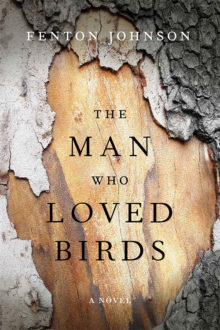 The Man Who Loved Birds
The Man Who Loved Birds
by Fenton Johnson
Published by University of Kentucky Press
Published February 5, 2016
ISBN: 9780813166599
Fiction
328 pgs. • WorldCat • Author’s Page
Reviewed by Stephen O. Murray
May 26, 2016
Fenton Johnson is an award-winning Kentucky-born writer whose third novel, The Man Who Loved Birds, follows by 22 years his second, Scissors, Paper, Rock (1994) (which appeared three years after his first, Crossing the River).
Johnson writes lush prose, sometimes bordering on the overwritten. I was interested in and convinced by his portrayal of charismatic marijuana grower, Johnny Faye, an illiterate veteran of the Vietnamese misadventure and of two people who become very enamored of him; Cistercians (Trappist) monk Brother Flavian, who has become restive with his increasingly capitalist community; and. Dr. Meena Chatterjee, a Bengali woman whose residence in the U.S. is dependent on service in an underserved area. Her office/residence is in what was a (gas) filling station in what is presumably Bardstown, in the Kentucky Knobs, near the Abbey of Our Lady of Gethsemane.
Johnny Faye, the title character, is comfortable in his own skin and content despite being the target of ambitious local prosecutor Vetch (rhymes with retch) who has failed to secure a conviction from juries of Johnny Faye’s peers. Johnny Faye is more concerned that Officer Smith (the generic violent policeman with the bland family name) is going to kill or do permanent damage to his squirrelly son, Matthew Mark.
Dr. Chaterjee (and Brother Flavian who is present and turns the boy over for the doctor) notices the welts on his back and knows that the vicious policeman also beats his wife. Her tentative status makes her afraid to buck local authorities, though she has a legal obligation to report the abuse. Johnny Faye urges her to protect the child, while dating Vetch and contemplating marrying her to cement her legal status. She is a more sympathetic character than I have made it sound, having fled the violence of Bangladesh’s formation, during which her parents were killed.
In that the novel is firmly based on a real case of licensed murder of a Kentucky marijuana grower, there is less suspense than there might be for a novel less tied to real events. The Reagan administration’s war on drugs, with a special focus on seizing the assets (land) of the Kentucky “cornbread mafia,” is also firmly based on history including the impunity of the side warring on drugs (the government). Other than what this reader knew before beginning reading the book, the endings are open (though one can easily plug in the later history of the “lawman” who got away with murder from the same historical records).
At a San Francisco Books Inc. appearance, Johnson said that he conceived the novel in 1971, when he was a seventeen-year-old Kentuckian looking forward to going to Stanford. He also said that he drew on speeches by Reagan, Cheney, and W for Vetch’s speechifying. He wrote about the 1971 murder in a New Yorker article; spent time (and interviewed monks) in the Abbey of Gethsemane (a basis for his book Keeping the Faith [2004], which also included interviews with Buddhist monks); and spent six months in Kolkata (Calcutta) getting the feel for Bengali desperation.
The University of Kentucky Press reissued Johnson’s first two novels along with publishing The Man Who Loved Birds.
© 26 May 2016, Stephen O. Murray

